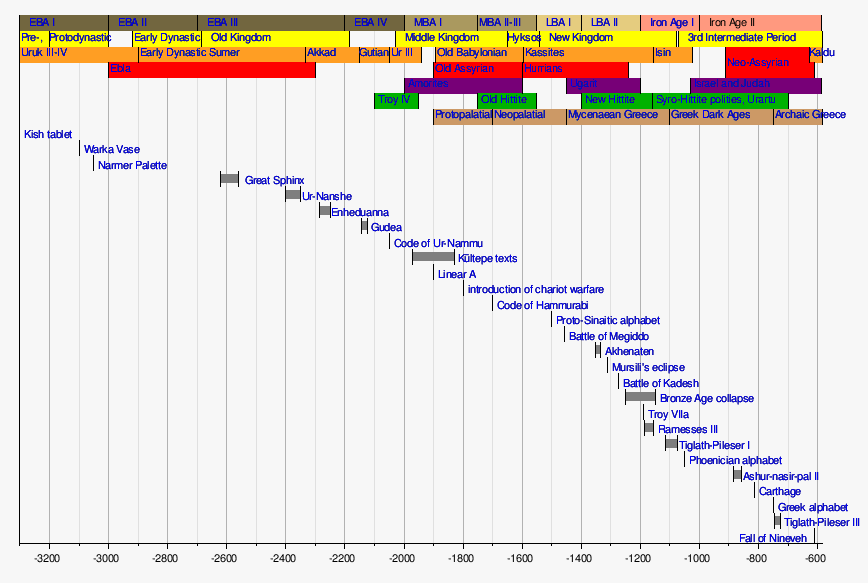 Cover of the first edition | |
| Author | Eric H. Cline |
|---|---|
| Audio read by | Andy Caploe |
| Language | English |
| Series | Turning Points in Ancient History |
| Subject | Late Bronze Age collapse |
| Publisher | Princeton University Press |
Publication date | 2014 |
| Publication place | United States |
| Media type | Print, e-book, audio book |
| Pages | 264 |
| Awards | 2014 The New York Post's Best Books. 2014 The Australian's Best Books of the Year. 2015 The Federalist's Notable Books. |
| ISBN | 9780691140896 |
| 930.1'56-dc23 | |
| LC Class | GN778.25.C55 2014 https://lccn.loc.gov/2013032059 |
| Website | Publisher - 1177 B.C |
1177 B.C.: The Year Civilization Collapsed is a 2014 non-fiction book about the Late Bronze Age collapse by American archaeologist Eric H. Cline. It was published by Princeton University Press. An updated edition was published in 2021.
Description
The book focuses on Cline's hypothesis for the Late Bronze Age collapse of civilization, a transition period that affected the Egyptians, Hittites, Canaanites, Cypriots, Minoans, Mycenaeans, Assyrians and Babylonians; varied heterogeneous cultures populating eight powerful and flourishing states intermingling via trade, commerce, exchange and "cultural piggybacking," despite "all the difficulties of travel and time".[1] He presents evidence to support a "perfect storm" of "multiple interconnected failures," meaning that more than one natural and man-made cataclysm caused the disintegration and demise of an ancient civilization that incorporated "empires and globalized peoples."[1][2] This ended the Bronze Age, and ended the Mycenaean, Minoan, Trojan, Hittite, and Babylonian cultures.[2]
Before this book, the leading hypothesis during previous decades attributed the civilizations' collapse mostly to Sea Peoples of unknown origin.[1][2][3][4]
Awards
The book has won the following awards:[2]
- Winner of the 2014 Award for the Best Popular Book, American Schools of Oriental Research
- Honorable Mention for the 2015 PROSE Award in Archeology & Anthropology, Association of American Publishers
- One of The New York Post's Best Books of 2014
- One of The Federalist's Notable Books of 2015
- One of The Australian's Best Books of the Year in 2014, chosen by filmmaker Bruce Beresford
- Selected as the 'Book of the Semester' Fall 2016, David M. Kennedy Center for International Studies at Brigham Young University
See also
References
- ^ a b c Gopnik, Adam (19 March 2014). "Of Hippos and Kings". New Yorker. Condé Nast. Retrieved 5 July 2017.
- ^ a b c d Summary (2014). "1177 B.C.: The Year Civilization Collapsed, Eric H. Cline". Princeton University Press. Archived from the original on 2017-07-19. Retrieved 7 July 2017.
- ^ Knapp, A. Bernard. "The Year Civilization Collapsed". History Today. Archived from the original on 2017-07-19.
- ^ Karacic, Steven (August 2015). "Eric H. Cline, 1177 B.C.: The Year Civilization Collapsed". Bryn Mawr Classical Review (BMCR). Bryn Mawr College. Retrieved 5 July 2017.
Further reading
- Cline, Eric H. (27 May 2014). "Climate Change Doomed the Ancients". The New York Times. Retrieved 3 July 2017.
- Knapp, A.; Manning, S. (January 2016). "End of the Late Bronze Age in the Eastern Mediterranean". American Journal of Archaeology. 120 (1): 99–149 (51 pages). doi:10.3764/aja.120.1.0099. JSTOR 10.3764/aja.120.1.0099.
- Book review: Warford, Erin (17 Mar 2017). "1177 B.C. - The Year Civilization Collapsed". The European Legacy. 22 (5). Taylor & Francis: 634–636. doi:10.1080/10848770.2017.1304058. S2CID 151497133.
- Book review: Hall, Thomas D. (Free PDF download) (2014). "A "Perfect Storm" in the Collapse of Bronze Age Civilization? Useful Insights and Roads not Taken" (PDF). Cliodynamics: The Journal of Quantitative History and Cultural Evolution. 5 (1): 1–12. doi:10.21237/C7clio5125316. University of California (publisher).
- Book review: Kotsonas, Antonis (2015). "E.H. Cline 1177 B.C. The Year Civilization Collapsed...". The Classical Review. 65 (2): 611–612. doi:10.1017/S0009840X15000128. S2CID 165120439.
External links
- ISBN 978-0-691-14089-6
- Publisher's site for this book
- Professor Cline's video lecture on his book.
- Full text of this book available on JSTOR









